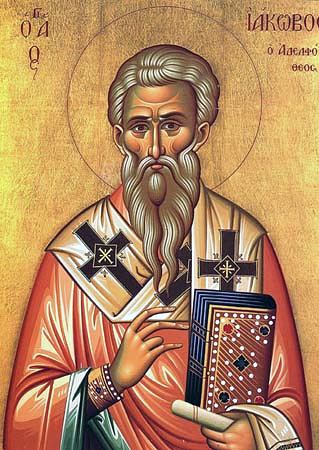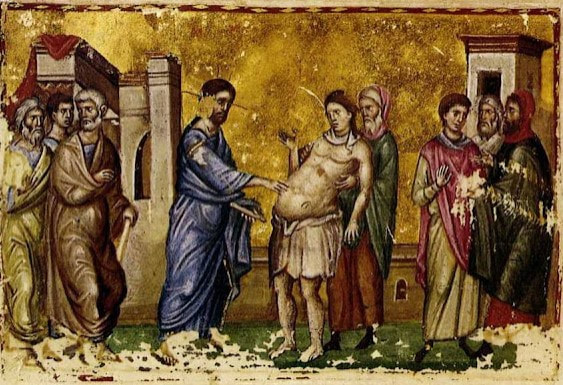Acts 15:12-22a
James 1:1-12
Pastor James Preus
Trinity Lutheran Church
October 23, 2022
Perhaps the most unpopular statement Jesus ever said was, “Whoever loves father or mother more than me is not worthy of me, and whoever loves son or daughter more than me is not worthy of me. And whoever does not take his cross and follow me is not worthy of me. Whoever finds his life will lose it, and whoever loses his life for my sake will find it.” (Matthew 10:37-38) Perhaps, people can handle this if their parents, children, and spouse stay faithful to Jesus, but when a child or spouse strays from the truth, Jesus seems to be a wedge separating them. And Jesus himself says that he did not come to bring peace but a sword, which would divide households (Matthew 10:34-36). People don’t want to love Jesus more than their children and spouse. And when it appears they must choose between them, they rarely choose Jesus and his Word.
Yet, Jesus is not unfamiliar with the division faith in him can cause to a family. We heard today how Jesus was rejected in his own hometown. St. John’s Gospel tells us that his brothers did not believe in him (John 7:5). And St. Mark’s Gospel tells us that his brothers thought Jesus was out of his mind (Mark 3:21). For this reason, as Jesus was teaching the crowds, his mother and brothers stood outside and sent messengers to fetch him. And Jesus responded, “Who are my mother and my brothers?” and pointing to his disciples, he said, “Here are my mother and my brothers. For whoever does the will of my Father in heaven is my brother and sister and mother.” (Matthew 12:46-50).
Jesus knew what it was like to be separated from his family on account of their unbelief. Jesus’ own brothers did not believe in him. And among these brothers was James. Yet, today we celebrate St. James of Jerusalem, brother of our Lord and martyr. By God’s grace, James was converted and reconciled to Jesus. St. Paul, when he lists the witnesses of the resurrection, specifically names James as a witness of the resurrection in 1 Corinthians 15(:7). St. Luke tells us in Acts 1 that Jesus’ brothers were among those after Jesus’ ascension devoting themselves to prayer with the apostles and faithful women. And later in Acts chapter 12, after the Apostle James, the brother of John was beheaded by King Herod and Peter was rescued from prison by an angel, Peter ordered that the news of his escape be given to James and the other brothers. From then on, James the brother of Jesus is distinguished as a leader of the church. St. Paul calls James along with Peter and John “pillars” of the church. And we saw in our first reading from Acts 15 that James presides over the council of Jerusalem, being the first bishop of Jerusalem. And the historian Josephus records that James the brother of Jesus Christ was stoned to death in Jerusalem in 62 AD on account of his confession of Jesus as the Christ.
The story of St. James comforts sinners today, because he was an unbeliever estranged from his brother, who became reconciled. And then, we see in Acts 15 that St. James continues to work toward reconciling the church of God.
Reconciliation. That is a word you should all know well. What is reconciliation? What does it mean to reconcile? It means to make an enemy a friend. It means to make peace with those who hate you. St. Paul writes of reconciliation in 2 Corinthians 5, “All this is from God, who through Christ reconciled us to himself and gave us the ministry of reconciliation, that is, in Christ God was reconciling the world to himself, not counting their trespasses against them, and entrusting to us the message of reconciliation. Therefore, we are ambassadors of Christ, God making his appeal through us. We implore you on behalf of Christ, to be reconciled to God.” (vss. 18-20). God reconciled the world to himself by putting those sins on Christ Jesus and having him die for them. Jesus was reconciled with his brother James when he showed him his pierced hands and feet with which he paid for the sins of the whole world. James was converted, and they were reconciled. You are reconciled to God when you have faith that God is at peace with you for the sake of Christ’s death and resurrection.
Reconciliation is something we should all desire fervently. We need reconciliation. We’re divided. We each go our own way. We don’t encourage one another in the faith as we ought. Christians feel torn between their devotion to God and their devotion to their family. And a common question among Christians is, “How can God forgive me if I can’t forgive those who have sinned against me?”
So, how can we be reconciled to those in our life who are at odds with us? How can we be reconciled with our church and our church family? How can we be reconciled with our spouses and children? The answer is faith. The reason we are not reconciled, is because we lack faith in Christ.
Now, St. James gets a bad reputation among Lutherans in regards to faith. In fact, many accuse St. James of having a different theology of faith than the Apostle Paul. They claim that St. James taught that a person is saved not by faith alone, but through faith and works while St. Paul taught that a person is saved through faith alone. This is because St. Paul wrote, “For we hold that one is justified by faith apart from works of the law.” (Romans 3:28) while St. James wrote, “You see that a person is justified by works and not by faith alone. (James 2:24). This statement from James’ Epistle even led Martin Luther to deny that James wrote it. However, the evidence is strong that James the brother of Jesus did write it. But it would be absurd to conclude that St. Paul and St. James disagreed on the most fundamental point of Christian teaching: How is one justified before God?
St. Paul and St. James were in complete agreement. Paul tells us in Galatians 2 that James, the brother of Jesus, along with Cephas and John gave him the right hand of fellowship after he explained to them his teaching (Galatians 2:9). And in Acts 15, James expresses full fellowship with Peter, Barnabas, and Paul as they encourage the Jewish Christians not to trouble the Gentile Christians with regards to the observance of the Law.
So, if Paul and James are in full agreement, why do they make statements that seem to be saying the opposite? It is because they are using the words in different contexts and with different senses. When St. Paul says that a person is justified by faith apart from works of the Law, he is saying that a person is reborn and saved when he believes that his sins are forgiven for Christ’s sake and not on account of his works. To be justified for Paul means that God has declared you righteous and a child of God. By faith Paul means a wholehearted trust in Christ’s salvation for sinners. When St. James says that a person is justified by works and not by faith alone, he means that a Christian is validated as reborn through his works. By justified, James does not mean to be saved, but rather to have your saving faith proven before others. When he says not by faith alone, James here does not mean a whole hearted trust in God’s grace, but rather a simple knowledge of Christ. A person is not justified by a simple knowledge of Christ alone.
James clearly does not teach that a person is saved by his own works. James teaches in the first chapter of his epistle that God brought us forth by the word of truth, meaning that we are granted rebirth through his word, which is believed through faith (James 1:18; Romans 10:17). Again, in chapter one, James says that it is the implanted word, which is able to save your souls (1:21).
So, James does not deride faith in any way, but rather he rebukes weak faith. Again, in chapter one James warns against praying without faith, stating that the one who doubts should not suppose that he will receive anything from the Lord. So, when we read James, we need to understand the context. James exhorts us to have a strong faith. A strong faith is not simply knowledge of events. Saving faith is not simply knowing that Jesus died and rose. James tells us that even the demons believe that God is one and shudder! (2:19) Rather, James tells us that a true, living faith produces good works. St. James says, “Faith without works is dead.” (James 2:26) Amen, I say. And you know who else would say, “amen” to that? St. Paul! It is he who wrote, “For by grace you have been saved through faith. And this is not of yourselves, it is the gift of God, not of works, lest anyone should boast. For we are his workmanship, created in Christ Jesus for good works, which God prepared beforehand, that we should walk in them.” (Ephesians 2:8-10)
Faith without works is useless, James says. Indeed, it is. If your faith isn’t producing good works, then you might have a dead faith! James understands this well. He was in Nazareth where his brother Jesus was rejected. And what do the Evangelists tell us? Jesus did not do many mighty works there, because of their unbelief (Matthew 13:58). Jesus couldn’t heal many people in Nazareth, because they lacked faith (Mark 6:5). Jesus couldn’t do many mighty works in his hometown, because, in part, his brother James did not believe in him. If you want mighty works of God to be done among you, you need to believe in Christ. No, not just mumble the Apostles’ Creed; not simply have a knowledge that Jesus lived and died and rose. You must trust in him! Lacking good works is a sign of a lack of faith, which alone justifies and saves.
The greatest work that can be done among us is to reconcile sinners to God. This is the work of God that is accomplished only through faith in Christ, who died for the sins of the world. Reconciliation is the greatest work that can be done. And if God was able to reconcile us miserable sinners with himself, who is holy and undefiled, with the blood of Christ, how much more can he reconcile us with each other?
We need to work on reconciliation in our homes, in our congregation, in our lives. How can we do this? Only through faith in the blood of Christ. Not a lazy faith. Not a dead faith. A living faith! This means that we need to hear the Gospel and believe it. We need to look at those scars of Jesus and trust that the blood that flowed from them washed all our sins away. And we need to insist on this blood of Jesus when we reach out to our family and loved ones. “Be reconciled with each other!” the blood of Jesus cries!
The early church was divided between Jews and Gentiles. For many centuries they had been enemies. But James preached that they should be reconciled. St. Paul explains it in Ephesians 2, “For he himself is our peace (meaning Christ), who has made us both one and has broken down in his flesh the dividing wall of hostility.” The dividing wall of hostility between Jews and Gentiles was broken down by the blood Christ. Jewish Christians and Gentile Christians are brothers and sisters in Christ. And so, we should regard each other the same. What divides us? What keeps us from being friends? What hinders our reconciliation? Is it anything that the blood of Christ cannot overcome? God forbid us to think so! It is a blasphemy! Jesus has taken away the sins of the whole world. It is sin that divides us. If our faith in Christ were stronger, then we could overcome every sin, which divides us.
When St. James was an unbeliever, he no doubt thought he had faith. But when he was converted by the blood of Christ, he realized that his previous faith was dead. So, St. James of Jerusalem, Jesus’ brother, exhorts us to a strong faith in Christ Jesus. And through this faith in Christ, the greatest work of reconciliation will be accomplished among us. Amen.



 RSS Feed
RSS Feed